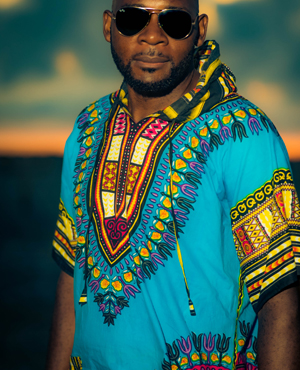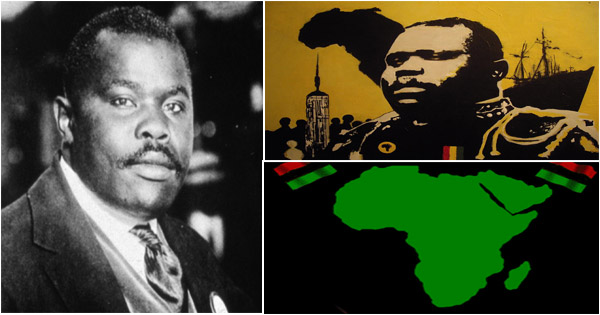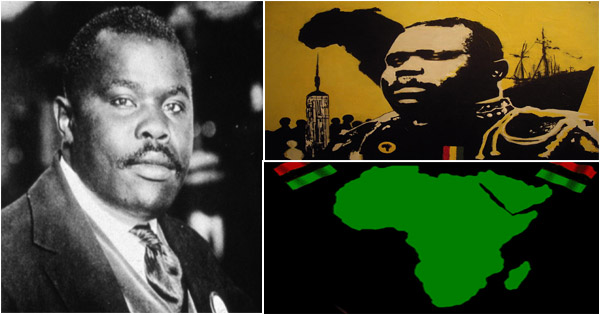
Marcus Garvey: leader of the Back to Africa movement & pan-Africanist
A people who don’t know their past, their origins and their culture resembles a tree without roots. “Quote from Marcus Garvey.
When I see the situation of African-American, Afro-Latinos or even Caribbean blacks, I automatically think of what Marcus Garvey would have thought. I think his heart would have been hurt to see that in the 21st century, blacks still suffer discrimination in the world and that in some countries the situation has even worsened. Every 10 or 20 minutes, an African-American or Afro-Latino black man dies as a result of the failure of a racist police force, which is motivated by fear of others. But, fortunately, there are very good men in the police force. And unfortunately, there is no justice for the victims, as the perpetrators are often acquitted. I hear the screams of rapper Akon, following the death of a young black man in the United States to return to Africa. For too much is too much, how long will the black people be oppressed? When will we be entitled to reparations following slavery? Maybe Marcus Garvey’s go back to africa is a form of reparation. The abducted children, descendants of slaves, return to discover the land of their ancestors. But would Africa be ready to accept them? Are we ready to grant them dual nationality? That, the future will tell us. Today, Afroculture.net looks at an exceptional man who has campaigned all his life for the cause of blacks, a hero and a leader named Marcus Garvey.
The birth of a visionary.
On August 17, 1887, Marcus Mosiah Garvey was born in Saint Ann’s Bay, Jamaica, into a large family of eleven children. Despite the abolition of slavery, Jamaica is an oppressed and racially segregated island. The living conditions of blacks often remain difficult and it is necessary to fight daily to be accepted. Very young, little Marcus is passionate about reading. At the age of 14, he decided to drop out of school to become a printer. Curious, he wanted to know the world and went on a trip to Latin America, the United States and Europe. Saddened, he realizes that the fate of blacks is dramatic. Everywhere, they are victims of racial discrimination and often have inferior social positions. Touched in his deepest being, he wants to do something to help his community. He is thirsty for justice and equity for a people who have been oppressed for too long.
Upon his return to Jamaica, marked by what he saw in South America, Garvey matured the foundations of the UNIA in his head (Universal Negro Improvment Association). He wants to create a strong movement to improve the lives of blacks around the world and to which he will soon devote his life.
In 1916, he arrived in the United States where he met all the movements for the emancipation of African Americans. In order to help his community, in 1917, he founded the UNIA (Universal Association for the Improvement of the Black Condition), which is still active today. Its purpose is to help and elevate its community by advocating redemption through repatriation. Their motto is “One God! One aim! One destiny!”, which means “One God! A Goal! A Destiny! “Its headquarters were transferred two years later to New York.
An excellent speaker, many people recognize himself in his words and he became a true leader and leader of the black cause. Its reputation crosses the borders of the world. Ironically, his idea was supported by members of the Ku Klux Klan, who fully supported this ethnic cleansing through voluntary departure.
Marcus Garvey’s thought.
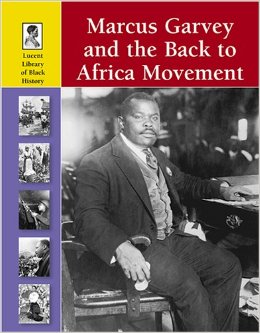
Having travelled extensively, Marcus Garvey settled in Harlem from 1918 to 1922, following the First World War. In his heart, he does not think that African-American blacks could live free and be respected in America. He has all too often witnessed the racial discrimination faced by the black community. He thinks that blacks would be happier if they returned to live in Africa, on the land of their ancestors. He is the promoter of the “BACK TO AFRICA” movement and wishes for the international repatriation of blacks to Africa. More precisely in Liberia or Ethiopia. He is in favour of a clear separation between blacks and whites, because they think that whites will never accept blacks.
Leaders such as W.E.B DUBOIS, A Philip Randolf or others are totally opposed to his thinking. Because they are the proponents of integration. And, they quickly create new enemies. But, fortunately for him, others like Malcolm X’s father firmly believe in his ideas.
How does he plan to realize his ideas?
1/ A shipping company for a return to Africa.
In 1919, Marcus Garvey created the Black Star Line, a shipping company that was supposed to serve the repatriation project to Africa. The Black Star Line was intended to serve the United States (north or south), the West Indies and the Caribbean to bring blacks back to Africa, to the land of their ancestors. It is clear that the idea is well thought out.
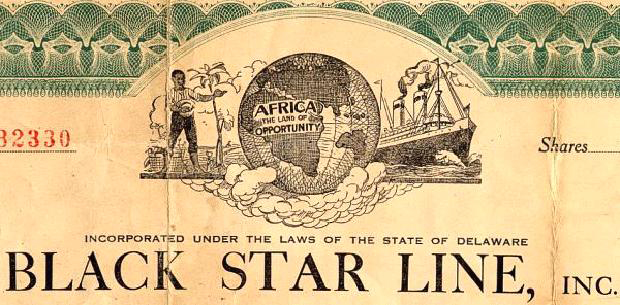
They are asking for the help of African Americans to finance the investment of its fleet. Respected, it is followed by 250,000 or even 300,000 supporters. The federal authorities then began to take an interest in him. As early as 1922, thanks to the support of African Americans, Marcus Garvey was able to acquire 4 transatlantic liners. A real shock wave, among blacks and whites, everyone was impressed by a man who understood that the only way to political power was through economic power. He spoke, but he had the courage to take action. The Black Star Line was a brilliant idea that witnessed the support and love of an entire community.
2/ Creation of the Negro World newspaper and factories & distribution networks.
To explain UNIA’s positions, Marcus Garvey decided to found a newspaper called “The Negro World”. This newspaper publishes Garvey’s speeches and passes information that is not reported in other newspapers. He very clearly describes his thoughts on black pride and the return to Africa for African Americans and Afro-Caribbeans.
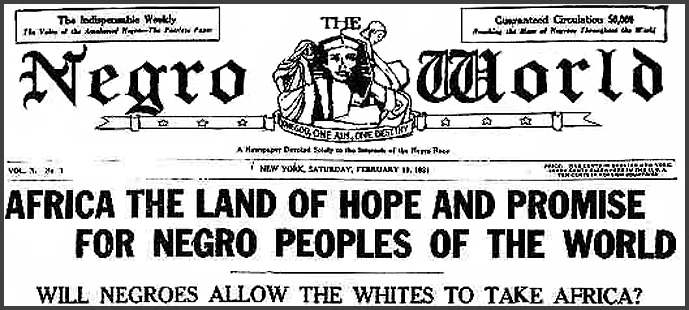
In addition, Garvey says that blacks will only be respected when they are economically strong. Many colonial governments, seeing this newspaper as a threat, banned its publication in their countries.
In addition, Marcus sets up factories and distribution networks to support his actions.
3/ Land negotiations with the Liberian government to welcome African Americans, Afro-Caribbeans and Afro-Latinos.
Marcus Garvey did not stop at the acquisition of a shipping company to bring back the blacks deported by slavery to their native land. He is negotiating an ambitious project with the Liberian government. Indeed, he wants to acquire land for African Americans, Afro-Caribbeans and Afro-Latinos, who wish to return to Africa. For him, it seems like a form of reparation for human dignity following slavery.
In return, he will take various actions:
- 1/ It will provide financial assistance to Liberia for the construction of schools and hospitals.
- 2/ He transferred the UNIA headquarters to Liberia, not to mention that they have more than 6 million members.
- 3/ It will proceed with the liquidation of Liberian debts.
- 4/ The black people who arrive will contribute to the development of agriculture and natural resources, etc.
The Liberian government was very enthusiastic and excited about this ingenious proposal. Imagined the historical weight, if it had happened. But, unfortunately, the jealousy and pressure of the colonial powers of the time will once again sabotage this project. They will force Liberia to give the land to an influential American company Harvey Firestone, supported by the American government.
The difficulties encountered by an ambitious man.
Unfortunately, for him, the shipping company “Black Star Line” went bankrupt. In 1922, Marcus Garvey was accused of fraud against these shareholders. Reality or sabotage on the part of her enemies? God only knows the truth. Marcus Garvey and three of his partners are being prosecuted for fraud in the courts. He was sentenced to 5 years in prison at the Atlanta Federal Penitentiary in 1925, but only two years later. Then was sent back to Jamaica in exile by President Calvin Coolidge in 1927 and banned from the United States.
Back in Jamaica, Marcus is welcomed as a national hero of the country. All the Jamaicans are rushing to listen to his speeches at his meetings. Jamaica’s entire political life is literally disrupted. In his speeches, he often referred to Ethiopia with a prophecy: “Look to Africa, where a black king will be crowned, who will lead the black people to their deliverance. »
This simple sentence had a considerable impact on the Rastafarian movement. For them, it is a true prophecy. On November 2, 1930, in Ethiopia, Ras Tafari Makonnen was crowned as Heile Selassie I, which means “Power of the Holy Trinity”. He is the leader of one of the first officially Christian nations in history, Abyssinia. Selassie would be the direct descendant of King Solomon and Queen Makeda of Sheba. Because of his titles of “King of kings”, “Lord of lords” attributed to the messiah in the Apocalypse of John, he will be considered as the messiah by the Rastafarians.
Death of Marcus in England.
In 1935, Marcus Garvey decided to return to England. He continues to fight for his ideas by developing UNIA. But on June 10, 1940, he died of a heart attack in London at 53 Talgarth Road in London’s Hammersmith district. Unfortunately, for him, he died without ever having had the chance to return to Africa. In 1964, his ashes were transferred to Jamaica where he became a national hero.
Popular in Africa and singing by Jamaican artists like Burning Spear, Bob Marley, Greg Rose and many others, but also by the hip-hop world with rappers like Mos Def, Kendrick Lamar and Talib Kweli and in Africa with Tiken Jah Fakoly. He remains in collective memories as a fervent militant of the black race. A man who sacrificed his life with concrete actions for the well-being of his people. A man who wanted more justice for an often oppressed people, who unfortunately still suffers from racial discrimination.
A few quotes from Marcus Garvey!
A race without any authority and power is a race that does not respect itself. »
Be as proud of your race today as your fathers were in the past. We have a wonderful history, and we will create another one in the future that will amaze the world. »
Education is the means by which a people prepares itself for the creation of its own civilization and also the advancement and glory of its own race. God and Nature have made us what we are, but through our creative genius we make ourselves what we want to be. »
If you have no faith in yourself, you are doubly defeated in the race of life. It is possible that not all of us may live the reality of an African empire so strong, so powerful that it would impose respect on humanity, but we can still work during our lives and work to make this project a reality for another generation. »
Too many of us find excuses to flee the black race because we are led to believe that our race has no value – that it has never accomplished anything. Cowards that we are! We are the ones who have no value, because we do not contribute to the elevation and construction of this noble race. »
And for you, who is Marcus Garvey?
What does it represent to you?

